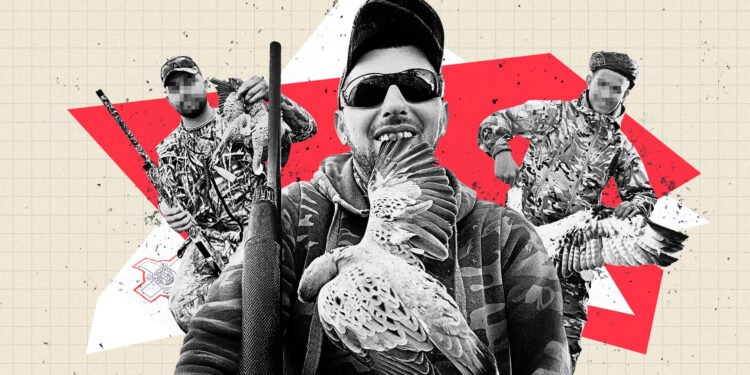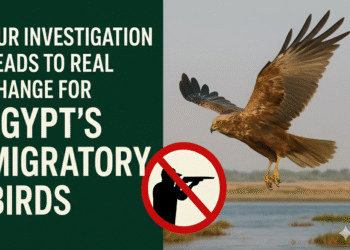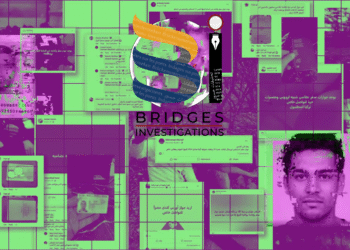A 15-month-long investigation by the New Arab Investigations unit (TNA) and Bridges Investigations (BI) sheds light on how the EU is spending money to protect the same birds that are being gunned down in Egypt.
Mahmoud Elsobky
Wael El-Sayegh
TheShift and Mongabay co-published a set of edited versions of this investigation.
As the sun hung low over the Nile, casting golden ripples across the water, we navigated Lake Naser. The air carried whispers of wings overhead, the soft rustle of migratory birds seeking refuge during their epic winter journey from Europe to Africa.
In January 2024, it was here, in these seemingly tranquil landscapes, that we began unraveling the tangled web of illegal bird hunting – a world where beauty and brutality collide.
Evidence was everywhere. In Malta, freezers filled with bird skins and carcasses were confiscated in raids, many tied directly to hunting expeditions in Egypt. The scenes were grotesque: a clash of cultures, politics, and conservation.
Hashim Morsi, an Egyptian bird watcher, recalled a shocking find in 2017. He discovered around 7,000 dead birds along an approximate 15 km stretch near Port Said. Many bore the hallmarks of Maltese poaching: plastic wrapping bearing text in Maltese.
In a call with Mahmoud*, a veteran hunting guide, he told us that “Italian hunters usually want ducks. Maltese hunters are the ones who want different kinds. The Maltese hunters take everything in sight… even stray dogs if they get the chance. In Aswan, I had Maltese clients, and we did what we could there.”
From Aswan, our investigation took us deeper into Egypt’s rural heartlands, tracing a shadowy trail to Fayoum and beyond. There, The New Arab (TNA) uncovered the digital footprints of Maltese hunters flaunting their prized trophies. At the core of this grim enterprise lay taxidermy: rare birds, hunted and smuggled, are meticulously stuffed and mounted to serve as coveted status symbols adorning Maltese living rooms.
In a small café overlooking Lake Qarun, we met Moustafa*, a hunting guide whose words were both candid and chilling. “Flamingos and spoonbills—those are the birds they like,” said Moustafa*, hinting at the preferences of his Maltese clients. “You could be sitting by the water, and suddenly a gazelle shows up – you take the shot,’’ he added.
This investigation spanned continents and exposed the cracks in international conservation efforts. The environmental stakes are high in Egypt, whose skies are populated by nearly 500 migratory and resident bird species.As we delved deeper, the scale of the destruction became undeniable.
Millions of euros flowed from EU conservation funds to protect these species, only for them to be gunned down by Europeans in Egypt. This is the story of a network that thrives on the fringes of legality, where the flight of birds is shadowed by the human desire for conquest and possession.
With exclusive accounts from conservationists, and hunting trip organisers, alongside public records of raids and arrests, this investigation highlights the urgent need for international cooperation to uphold global conservation commitments.
A tradition gone rogue: inside Malta’s hunting culture
Malta’s hunting culture is complex, steeped in tradition, and increasingly contentious. Mark Falzon, professor of anthropology at the University of Malta, pointed to how the island’s geographical constraints and limited native species make migratory birds a prime target.
Malta boasts one of the world’s highest densities of hunters, with approximately 75 hunters per square kilometer of huntable land. “For many Maltese hunters, the desire to hunt drives them to find new frontiers,” explained Brian Campbell, lecturer in anthropology at the University of Plymouth. Malta’s hunting issue, continued Campbell, is “a deeply polarised battleground where issues of sovereignty, conservation, and national identity collide head-on.”
The European Union’s strict laws have prompted Maltese hunters to travel abroad, and Egypt is one of their favorite destinations. According to Campbell, hunters view these trips as “their version of heaven, a release of pent-up frustrations”.
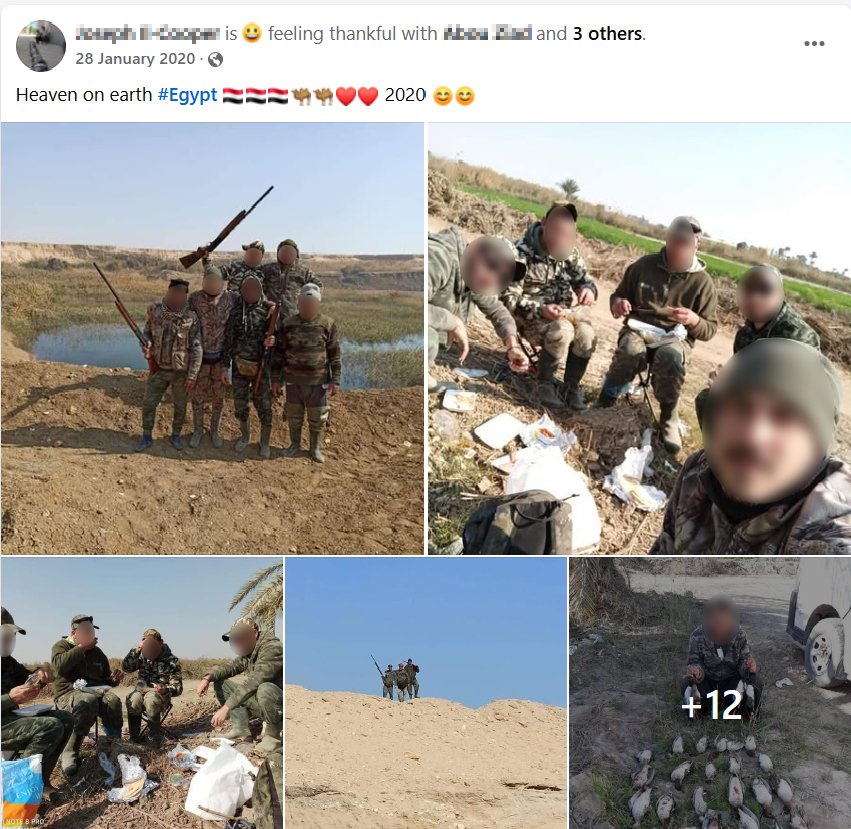
“It started very much in poor times when people needed to hunt birds for food. And progressively it’s grown into something more of a hobby, [which comes with] a status,” explained Nicholas Barbara, Head of Conservation at local NGO BirdLife Malta.
Berti Ferns, a conservation breeding manager who studied Maltese bird hunting regulations, pointed to the allure of predatory birds. “It’s a bit more charismatic, powerful, if you have a stuffed eagle in your home,” he told TNA.
According to Prof. Mark Falzon, “it’s a bit like football fans: you can boast about having watched all the games live in different stadiums. There’s a profound social element to hunting, but it’s not just that. We shouldn’t underestimate the extent to which this is a passion.”
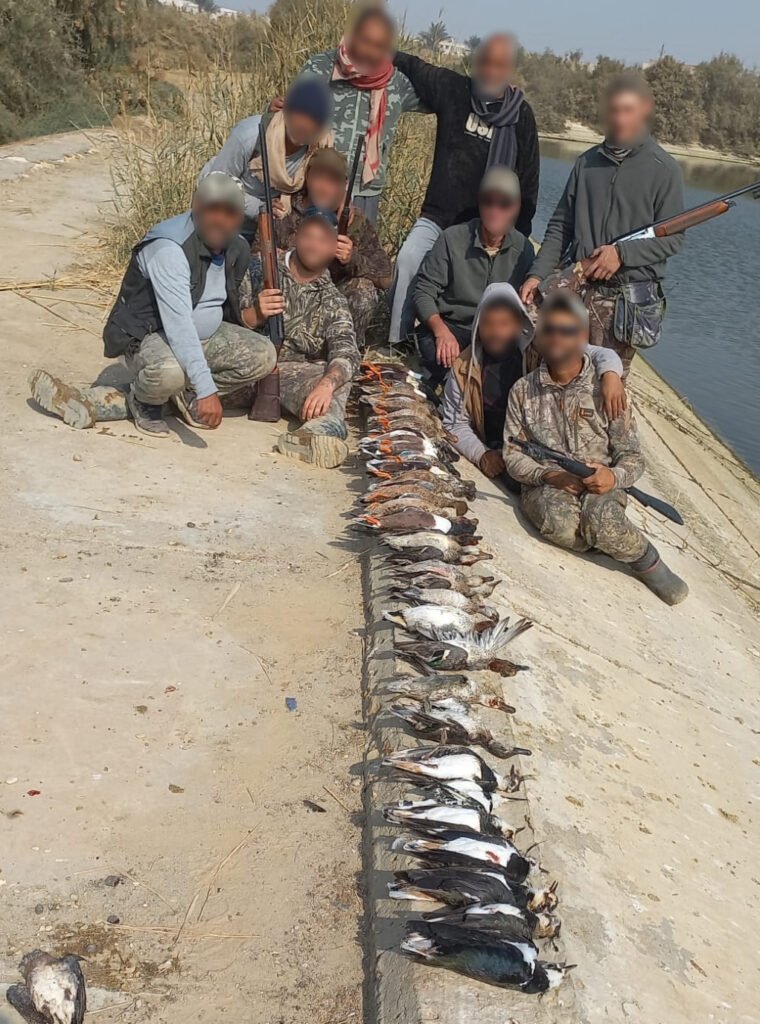
He explained that namra – a Maltese term describing an intense love for hunting – is what separates true hunters from mere hobbyists. “A real hunter is someone who makes sacrifices, wakes up early, and lives for the birds,” added Falzon.
Malta’s hunting lobby
Hunting in Malta isn’t just a cultural issue, it’s a potent political force.
Malta’s Gozo Island Minister Clint Camilleri, himself reportedly a hunter and trapper who has overseen the hunting portfolio since 2020, has been accused of circumventing EU regulations.
“The politicians in Malta believe that they have to allow the hunters to do what they want purely because they want to be reelected again,” commented Sultana, the BirdLife Malta CEO.
Shortly before the June 2024 EU elections, Malta’s Federation for Hunting and Conservation (FKNK) issued a statement titled ‘Why Hunters and Trappers Must Vote in the European Elections’, underscoring the influence that Members of the European Parliament (MEPs) would wield over the next five years on hunting regulations, species conservation, and firearms legislation.
Six MEP candidates from the ruling Labour Party endorsed a pro-hunting manifesto promoted by the FKNK. One of the Labour candidates was Steve Ellul, whose uncle Mario Ellul was found guilty of breaching wildlife protection rules in 2022; he was fined €6,000 ($6,360 at the time) and had his taxidermy license suspended for two years. Kenneth Ellul, Steve’s cousin, was also fined 1,000 Maltese lira ($3,130) in 2007 for possessing the skins of protected birds.
TNA contacted Clint Cammilleri, Steve, Mario, Joseph and Kenneth Ellul, asking whether they believed Malta was home to a politically influential hunting lobby. We received no response in time for publication.
In a phone call to Mario Ellul’s home, our interlocutor hung up at the mention of hunting trips to Egypt.
Speaking with TNA, Prof. Falzon emphasised that a referendum on spring hunting was one of only three referenda held in Malta in the last 40 years. “In Malta, a referendum is a very, very rare event. […] Malta is not Switzerland,” said Falzon, “this is to give you a sense of how much of a political issue this is.”
On 11 April 2015, a coalition of environmental groups organised a referendum to abolish the spring hunting of turtle doves and quails. 50.44% of the voters favored maintaining spring hunting, while 49.56% stood against it.
The EU’s Birds Directive had played a significant role in pressuring Malta to regulate the hunting of turtle doves and quails, particularly during their spring migration.
Falzon described the FKNK as “a strong hunting lobby”, but he also acknowledged its dual role, championing hunters’ interests while regulating their activities. Officially, explained Falzon, the organisation does not condone illegal hunting, and individuals convicted of breaking hunting laws risk losing their FKNK membership, effectively barring them from obtaining a hunting license.
However, the Maltese anthropologist acknowledged that “there can be a difference between what you officially do [as FKNK] and what you informally do.”
TNA contacted Lucas Micallef, the FKNK president, seeking comment on the federation’s political influence and regulatory role, and on the violations committed by Maltese hunters in Egypt. No response was received in time for publication.
Circumventing EU hunting laws
The European Union enforces strict hunting regulations to protect biodiversity and migratory bird species in particular.
According to Prof. Falzon, EU membership translated into rules that transformed the Maltese countryside into a monitored zone, under the watchful eye of conservation groups.
The hunters’ assaults against conservationists in Malta prove the extent to which they can go to protect their hobby. It is a battleground where bullets fly, cars burn, and activists risk their lives. Decades of intimidation, from gunshots fired at birdwatchers to arson attacks and ambushes.
BirdLife Malta’s Sultana underscored the motivation for hunters to seek foreign hunting grounds. “They go to Egypt and other countries to kill birds because they can do it in much larger numbers,” he explained.
“In Malta, numbers have dwindled significantly. But in Africa, [where] these birds winter – and just before their northern migration – they’re easy targets,” said Sultana.
The reliance on social media also emerged as a critical enabler for these hunters.
Researcher Bertie Ferns highlighted how hunters connect across borders and share photos online, comparing trophies and exploits. “Maltese hunters can see what Egyptian hunters are doing,” explained Ferns; they ask: “Why are we getting punished […] when the birds can, in a few days time, go to another country where it’s almost like a free for all?”.
Prof. Falzon highlighted the short-sighted approach of EU policies, since mobile species migrate without observing borders. “There is no point in protecting a mobile species at point A and killing it at point B,” he told TNA.
Falzon also emphasised the threat hunters pose to bird species resident in Egypt, in addition to migratory ones.
Infobox: EU hunting laws Vs. Malta
European hunting laws are primarily governed by the Birds Directive (Directive 2009/147/EC), which mandates the conservation of all wild bird species that are native to the EU.
The directive prohibits hunting during critical periods such as migration and breeding, and strictly regulates the species that can be hunted. Exceptions are allowed only under strict conditions and must not harm the species’ conservation status.
The EU’s commitment extends to financing conservation projects under its LIFE Programme, which is aimed at restoring habitats and safeguarding migratory routes.
Nevertheless, the European Commission recognises that the killing and trafficking of wild birds is still a major problem in the EU: “an estimated 25 million birds are killed every year around the Mediterranean Basin alone as they migrate between Europe and Africa.”
Following Malta’s persistent infringements, the European Commission referred the case to the EU Court of Justice, specifically contesting Malta’s licensing for finch trapping under an incorrect “research” exemption. Against the backdrop of the European Green Deal and the EU’s Biodiversity Strategy for 2030, Malta’s stance threatens the EU’s biodiversity goals.
Loosely Enforced Egyptian Laws
Despite a growing environmental crisis, Egyptian hunting regulations remain poorly enforced.
Haytham Ibrahim, conservation director at Nature Conservation Egypt (NCE), told TNA that the hunting decree would require “a comprehensive overhaul”. According to the conservation expert, Egypt’s regulations fail to protect endangered species effectively, reinforcing its reputation as a place where “you can hunt comfortably, away from any serious laws.”
A recent decree (No. 204), issued by Egypt’s ministry of environment on 27 August 2024, expanded tourist hunting permissions to include two new governorates, the New Valley and Sohag.
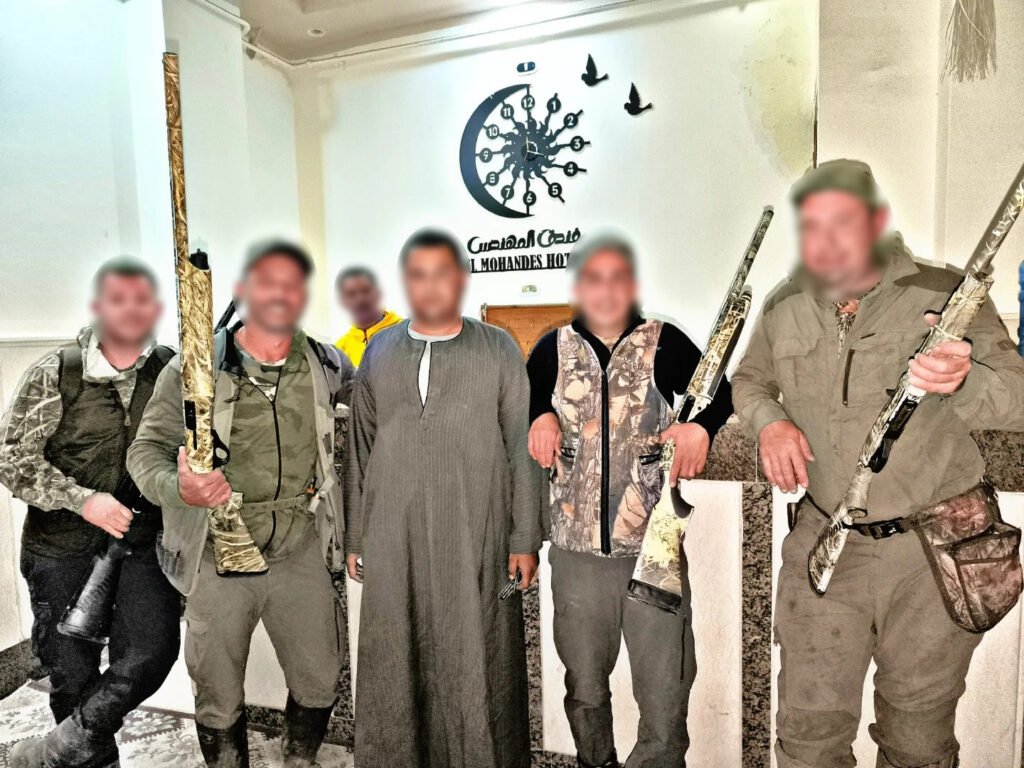
“This is a catastrophe,” said Khaled al-Nubi, executive director at Nature Conservation Egypt (NCE), a local NGO, “the oases [in the New Valley] are among the most delicate ecosystems on the planet – a haven in the vast desert for migratory and resident birds.”
Ibrahim explained to TNA that “the oases sustain agriculture and dates; a collapse in one part affects the whole,” likening them to “an island in a trench: without it, no one crosses to the other side”.
Al-Nubi harshly criticised hunting regulations while emphasising the need for “thorough studies to guide sustainable resource management. Anything less is an invitation to disaster”.
According to Ibrahim, pressure from tourism companies is behind Decree 204, which likely compensated for the hunting ban introduced in Lake Nasser in September 2023.
The New Arab contacted Egypt’s ministry of environment, to clarify whether any scientific study had been conducted before allowing hunting tourism in the oases. We also asked if there had been any pressure from the tourism industry. No response was received in time for publication.
Hunting trip organisers
Maltese hunters typically enter Egypt on standard tourist visas granted upon arrival, according to trip organisers and documents reviewed by TNA. The National Security Agency in addition to the ministries of environment and tourism issue the required permits.
Local hunting organisers and intermediary companies facilitate the process of securing permits to bring firearms and ammunition into the country, allowing each hunter up to 500 cartridges.
International actors also help enable illegal bird hunting in Egypt. A recurring figure in these networks is Kenneth “Kajju” Ellul, the relative of the MEP candidate, who published many photos on Facebook while hunting in Aswan.
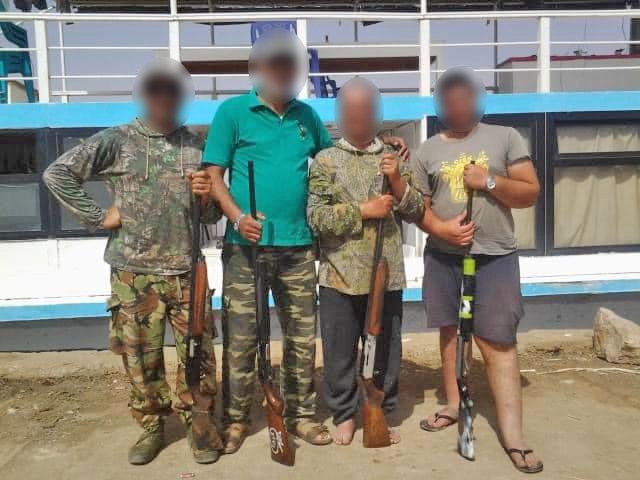
According to the EU-funded National Report on Hunting (2005), a relatively small number of local tourist companies organise hunting trips in Egypt, often in collaboration with independent guides and boat operators.
Eiffel Travel Egypt, Ibis, Saga, Stylish Holidays Travel, Egypt Time Travel are among the Egyptian registered tourism companies that organise hunting trips. These operations are occasionally coordinated through foreign tour companies.
Egypt Time Travel, Eiffel and Ibis have organised hunting trips for Mario, Joseph, Kenneth Ellul and other Maltese citizens, all of whom have been convicted of violating wild bird protection laws.
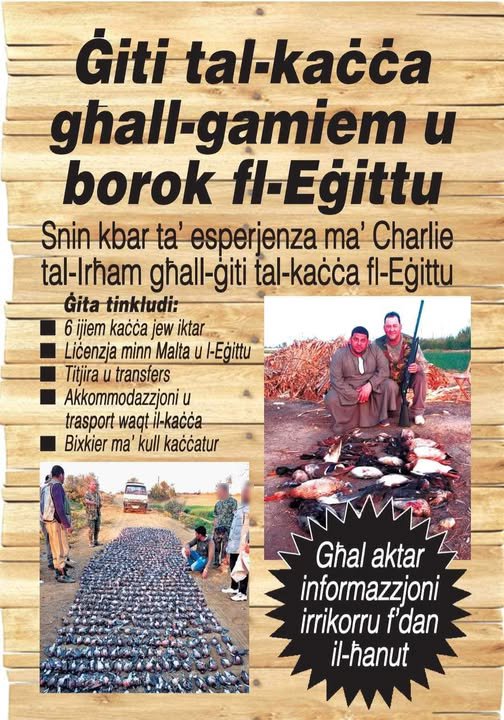
When we contacted Egypt Time Travel, inquiring about their role in facilitating the Elluls’ hunting trips, they responded that the company “operates in full legal authorisation and in full compliance with Egyptian wildlife protection laws”.
In defending its activities, Egypt Time Travel also added that it “operates independently and is not associated with any illegal entities or groups”.
Similarly to Egypt Time Travel, Eiffel Travel Egypt responded that they abide by Egyptian laws. They also declined any responsibility “for any communication between hunters and people who do not work for us in the company”. The remaining companies did not respond to our requests for comment in time for publication.
Other videos and pictures suggest that hunters are able to kill between 450 and 1,500 birds in a single day or trip.
Given the scale of the violations committed in Egypt, MEP Anja Hazekamp was critical of how funds were being spent on conservation programmes in the EU. “It’s a waste of money. It’s a waste of the efforts of all these people that try to save this beautiful bird,” she told TNA.
The EU also allocated funds for the protection of another endangered species hunted by the Maltese, the Egyptian vulture.
TNA contacted the EU Commission, inquiring about the effectiveness of conservation programmes that allocate funds for species that are targeted elsewhere. We received no response in time for publication.
The Future of International Conservation
Hazekamp believes hunters should not be part of conservation efforts. “People that use guns to kill other creatures should not be involved in protecting these creatures,” she insisted, brushing aside arguments that hunting could be sustainably managed.
NCE Executive Director Khaled al-Nubi analysed the challenges looming over the engagement of Maltese hunters in conservation. “Their rituals revolve around over-hunting, shooting in every direction, it’s tied to their heritage. Bridging this mindset with conservation goals is no easy task,” said al-Nubi.
As an alternative to hunters, he proposed bringing to Egypt Maltese bird photographers. “Let them experience the beauty of Lake Nasser through eco-tourism, not gunfire,” he said.
Berti Ferns, the conservation breeding manager, disagrees with al-Nubi. “Conservation cannot succeed if hunters are treated as the enemy and conservationists as heroes, it’s a battle that leads nowhere,” he told TNA. Ferns believes that fostering collaboration with hunters, rather than alienating them, could be the key to addressing the challenges posed by Maltese hunters travelling abroad.
Ferns is an advocate of establishing hunting quotas grounded in robust, science-backed data. “Whether we like it or not, hunting is a tradition for some people, and it can be done sustainably,” he noted.
In Egypt, NCE Conservation Director Haytham Ibrahim echoed the call for sustainable practices, while distinguishing between hunting and poaching.
According to Campbell, the anthropologist, it is impossible to “negotiate with somebody whose ultimate goal is to stop hunting”, especially if they see hunters as “barbarians and uncivilised beings”. In his view, “the demonisation of hunters” contributes to exacerbating tensions and fueling mistrust.
Hashim Morsi, the Egyptian birdwatcher, thinks that “the EU can only do so much,” given that hunters arrive with legal paperwork. The real issue, he told TNA, begins with the ease of noncompliance once they cross borders.
BirdLife Malta’s Mark Sultana underscored the importance of developing cross-border conservation models and singled out Kenya as a business model for ecotourism that could be inspirational for Egypt.
Efforts to address the poaching and smuggling of migratory birds by Maltese hunters across North Africa and Europe face challenges on multiple fronts.
While the European Union invests millions of euros in conserving these species, their efforts are undermined by European hunters exploiting poor law enforcement in non-EU countries like Egypt.
Local communities reliant on hunting tourism face economic uncertainty, while ecosystems bear the brunt of unchecked exploitation.
“This isn’t just about birds, it’s about the survival of entire ecosystems and the choices we make as a society,” warned Khaled al-Nubi (NCE).
“If we allow reckless hunting to persist without science-backed regulation, we’re not just losing species, we’re dismantling the delicate balance that sustains us all,” he added.
* Pseudonyms have been used for these names for security reasons.
This investigation was developed with the support of JournalismFund Europe.
Fact-checking and research:
Investigative Researcher/Journalist Anas Ambri
Editing and supervision: TNA Investigative Editor Andrea Glioti
Sensitive info and tips are to be sent via encrypted email to
bridgesinvestigations@protonmail.com



